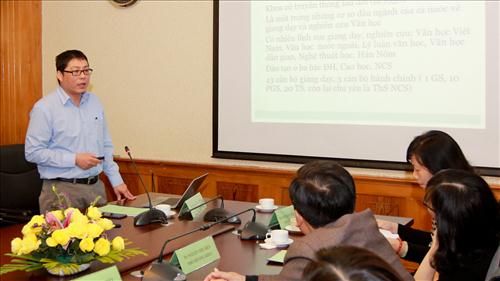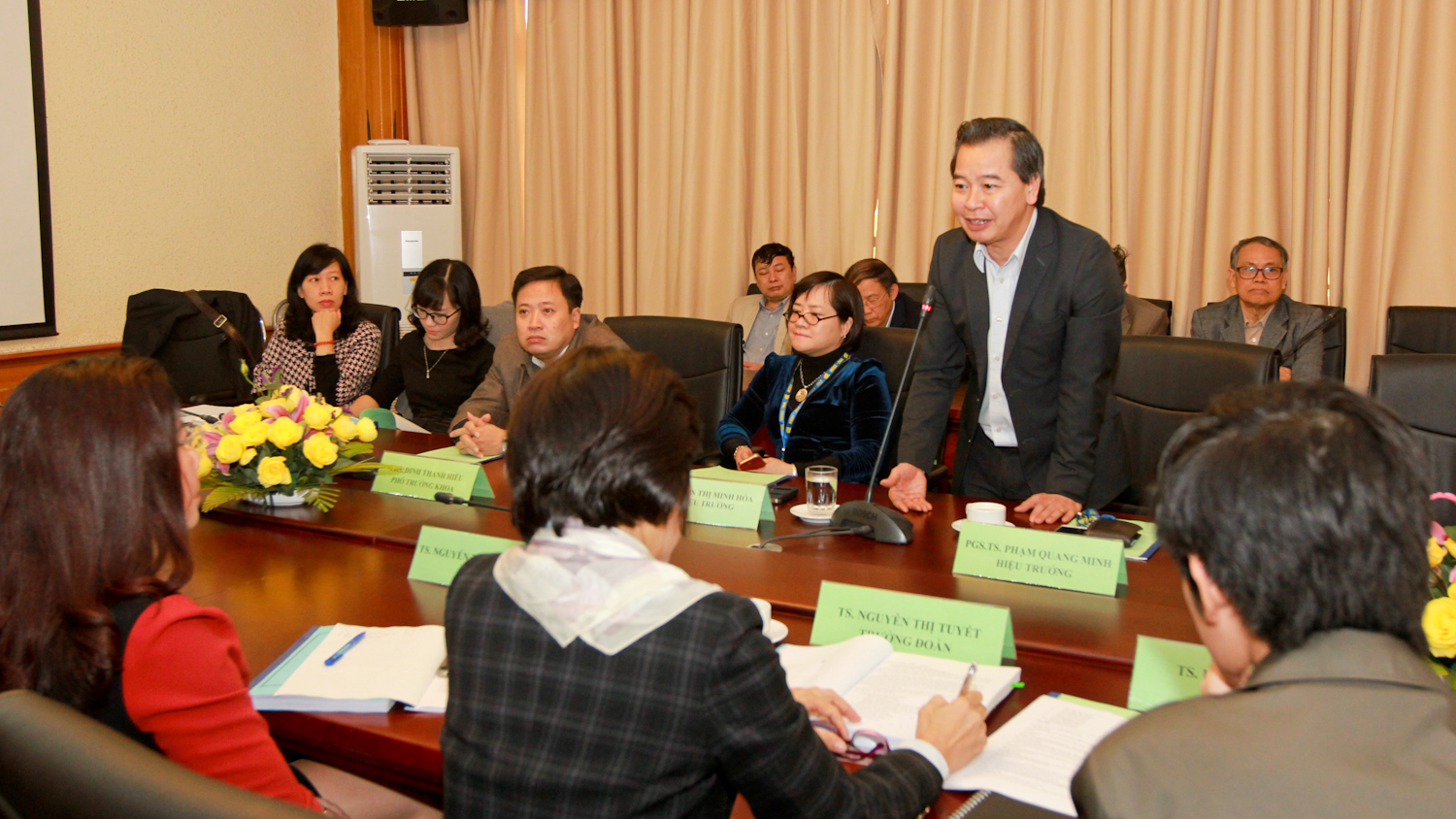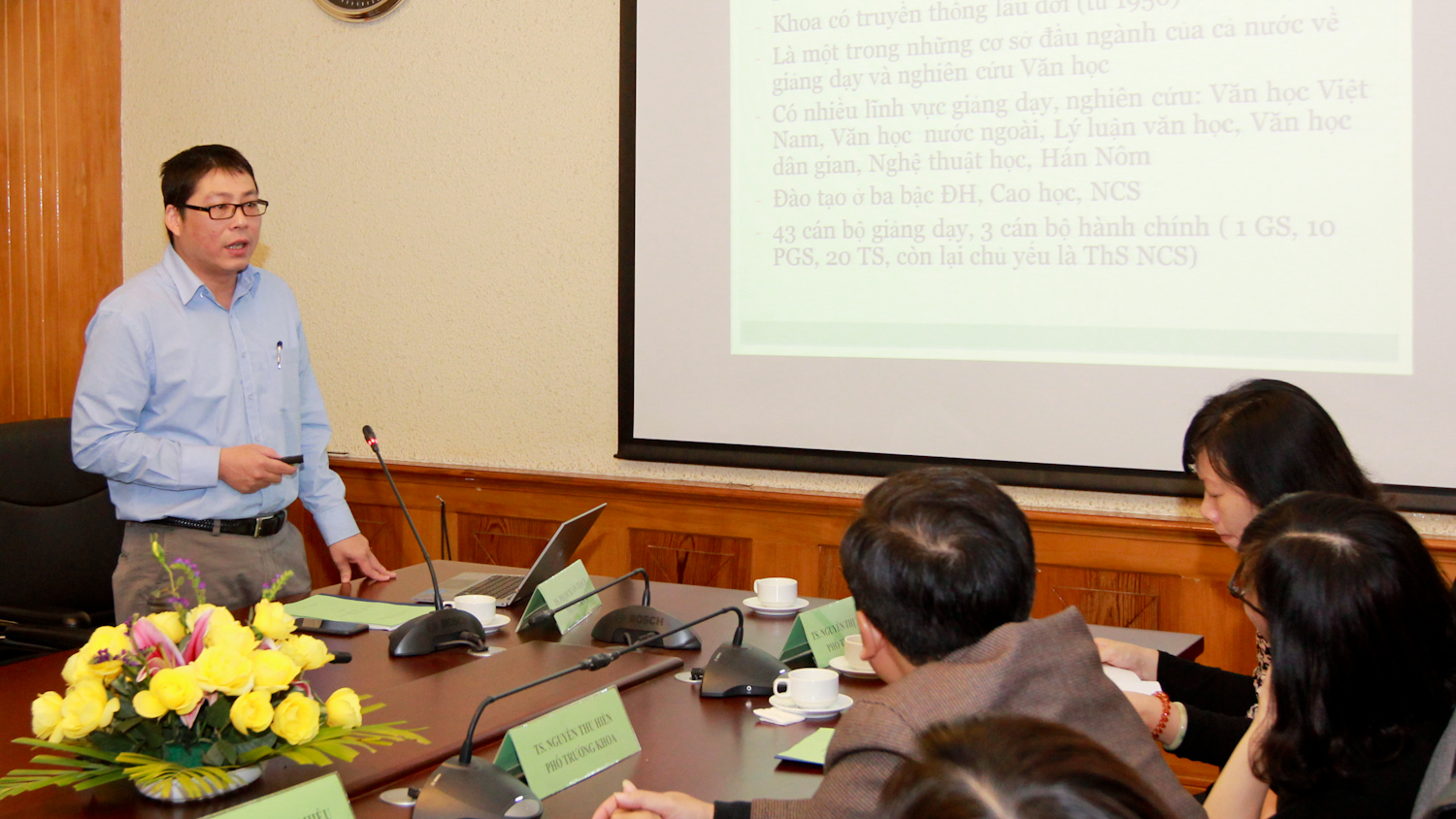
Attending the opening ceremony, on the side of the peer quality assessment expert team were Dr. Nguyen Thi Tuyet as Head of the team, Dr. Nguyen Thi Thu Huong as Secretary of the team, and Dr. Bui Ngoc Kinh, Member.

Associate Professor Pham Quang Minh, Rector of the University, delivered the opening speech for the program.
Representing the University of Social Sciences and Humanities, Vietnam National University, Hanoi were Assoc. Prof. Dr. Pham Quang Minh, Rector of the University and Chairman of the High-Quality Literature Program Evaluation Council; Assoc. Prof. Dr. Tran Thi Minh Hoa, Vice Rector of the University and Vice Chairman of the Council; along with representatives from various functional departments within the university and faculty members from the Faculty of Literature.
In his opening remarks, Associate Professor Pham Quang Minh reiterated the role of quality assurance in the university's training activities, emphasizing it as a crucial requirement in the process of development and international integration.
The purpose of the self-assessment of training program quality is to evaluate the extent to which training programs at specific levels meet the quality accreditation standards set by Vietnam National University, Hanoi. This aims to assess the current state of quality and to improve and enhance the quality of the training programs in order to apply for accreditation.
“Based on the experience gained from previous accreditations (AUN accreditation, external evaluation, and peer quality assessment of the high-quality programs in Management Science and Philosophy), the departments within the university need to uphold the spirit of service, cooperation, and provide maximum support to the external evaluation team and the Faculty of Literature during the evaluation period,” Assoc. Prof. Dr. Pham Quang Minh emphasized.

Dr. Pham Xuan Thach, Head of the Faculty of Literature, presented the self-assessment report on the high-quality undergraduate program in literature.
Following the opening remarks, Dr. Pham Xuan Thach, Head of the Faculty of Literature, presented a self-assessment report on the high-quality undergraduate program in literature. The report consisted of three parts: a general introduction, a self-assessment of the program based on 15 standards, and an analysis of the program's strengths and weaknesses.
Following the opening ceremony, in the morning, the evaluation team will assess the evidence of the high-quality literature program and conduct interviews. The peer evaluation of the high-quality bachelor's program in literature is expected to take place over two days, from January 5th to 6th, 2016.
|
Some fundamental strengths of the high-quality Literature program. 1. Learning outcomes, structure, and content of the training program. The learning outcomes and training programs are developed and adjusted according to established procedures, strictly adhering to the regulations, rules, and guidelines of Vietnam National University, Hanoi and the University of Social Sciences and Humanities. Learning outcomes are clearly defined in close relation to the content of the training program, with timely adjustments based on practical needs and new regulations. The training program is designed in close relation to the learning outcomes. Each module in the training program has its own defined training objectives and learning outcomes, contributing to achieving the overall program's learning outcomes. The program is structured with a prescribed proportion of knowledge blocks, ensuring a relatively broad and deep range of knowledge and skills in accordance with the learning outcomes. The program focuses not only on cultivating knowledge and professional skills but also on developing personal and social ethics for learners.
Dr. Nguyen Thi Tuyet, Head of the evaluation team, delivered a speech at the opening ceremony. 2. Training activities The department has a clear teaching and learning strategy, with the motto of putting the learner at the center of the teaching process, helping learners to be more proactive in grasping specialized knowledge and supplementary skills, combining learning with scientific research. The assessment methods are diverse, varied, and continuous throughout the learning process. The high-quality training program is organized separately and receives priority investment. 3. Staff The teaching staff is sufficient in both quantity and quality, with 43 lecturers (1 Professor, 10 Associate Professors, 9 Doctors, 17 Masters currently pursuing doctoral studies... including many lecturers who are leading scientists in their respective fields). To ensure high-quality teaching of the courses, the Faculty prioritizes assigning lecturers with high academic ranks and degrees, and extensive professional experience. The Faculty always pays attention to and implements staff development according to plan. 4. Facilities Lecture halls and classrooms are equipped with modern teaching equipment, basically meeting the requirements of a high-quality teaching program. The learning materials are relatively abundant, with a large number of books, journals, and reference materials serving the training program, as well as a rich selection of open educational resources. |
Author:Hoai An
Newer news
Older news